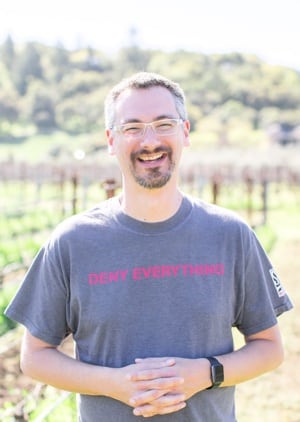So you want to be “Internet Famous” in the IT community, but you don’t want to spend your mornings and weekends slaving away on the work I described in my last post? I’ve got good news – there’s an easier way.
Think About Celebrities You “Know”
If you’re like me, you watch television, and you’d count some/many/most of the people on TV as celebrities, for various values of celebrity. For example, I was walking down a New Orleans street after dark once and saw Josh Harris, now skipper of the Cornelia Marie, a crab boat on the show Deadliest Catch. He had a woman on each arm, a big grin on his face, and gave me a nice polite nod when he saw the look of recognition on my face.
You need to understand that I don’t look at faces.
I take Ernie for multiple walks a day down some of the busiest streets in Chicago, and I have a total lack of situational awareness. I don’t scan faces looking for people I recognize. But my wacko brain somehow caught Josh in my peripheral vision and zoned in on him. Nobody else on the street was paying him any mind, and there wasn’t a spotlight. I just unconsciously picked his face out and realized it was The Josh Harris.
To me, in my oddball little world, Josh Harris is somewhat of a celebrity because he’s been in my living room for hours, spending quality time with me and my family.
How Facial Recognition Works
For people to recognize you, they need to see your face and hear your name.
Go back and read that again. Say it out loud. Here, I’ll help drive the point home:
See what I mean? That video makes a world of difference if you want to recognize me by my face, my mannerisms, my tone of voice.
You’re going to have to do that, and you’re going to have to do it as often as possible.
But Doing Webcasts and Videos Usually Means Writing Content.
See, this is the part that sucks. I do technical webcasts and videos all the time, and I can tell you that it easily takes 4-8 hours of work – minimum – for each hour of technical content I build. Last week’s post on being Internet Famous for technical content explained how much work that is, and how much time it takes from your limited personal schedule.
When you tack on the work it takes to build videos, produce them, get them out onto the web, SEO them for great distribution, and more, you’re talking about dozens and dozens of hours per week.
If you don’t have that kind of time, that’s where Kim Kardashian, Josh Harris, and Oprah come in.
Getting Out There Without Writing Content

Kim Kardashian lives a glamorous life that millions of people find interesting. She and her family have a TV crew follow them around to film their adventures. She doesn’t write content – her life itself is the content.
Josh Harris and the other Bering Sea fishermen have a similar deal, but it’s less about vapid celebrity and more about following them around at work. People love tuning in to watch their struggles and triumphs. Now here, the tables turn a little – there’s more captains and fishermen, and they’re not going to all become millionaires from that TV contract. They’ll be famous, but they’re still going to have to work their day jobs.
Think that’s irrelevant to the technical community? I bet not – I bet a well-produced weekly video show about the life of a very interesting technical team would be a smash hit in the technical community. No, they’re not going to get a contract from E! TV, but they’d garner a huge following of geeks pretty quickly. I’d watch a weekly show about what happens behind the scenes at Stack Exchange, for example. The challenge is that there’s a huge investment required to make something like this work – a film crew, editing, screening for NDA content, and putting it all up online.
The Easier Way for Individuals: Show Hosts
All over the world, people tune in to talk shows every week. Step back and think about the broader definition of talk show:
- Bill O’Reilly
- Howard Stern
- Oprah Winfrey
- The View
- Talking head news shows
There are dozens of examples in all kinds of different formats, but they all share something in common: the host(s) bring in someone else to cover a technical issue while the host bounces questions off them. The host puts themselves in the audience’s frame of mind, asks questions the audience would ask, and often recaps his own personal feelings with the audience afterwards.
There’s still a lot of work involved – inviting the guests, coordinating the topics, recording the show, producing it afterwards, putting it up on the web, and so on. This work is reasonably easy to outsource as the show grows, though, because this work is logistical rather than deeply technical. You don’t have to hire a SQL Server genius to do it – as opposed to trying to scale getting your video out there with technical content, which would require subcontracting the technical writing out to someone else.
It might be tempting to start an audio-only podcast, but those are not going to get you facial recognition. Could you pick Matan Yungman, Greg Low, or Richard Campbell out of a lineup? Odds are, no – but those guys run the SQL Server Radio podcast, SQL Down Under podcast, and .NET Rocks podcast respectively. Nothing against podcasts, but if you want to be recognized when you step into a conference, an audio podcast isn’t going to cut it.
This market is completely wide open in the database world, and it’s mostly open in all of IT for that matter. You’re not going to get rich doing it, but if your goal is to be Internet Famous with a minimum of spare time, here’s your sign. Get your face, voice, and name out there.


8 Comments. Leave new
See former television host Leo Laporte (http://twit.tv/people/leo-laporte). He’s an expert in video based Internet shows about technology. And he’s a face you might recognize in person.
Joseph – yep, not really related to databases, but it does prove that this kind of approach works.
Congrats Brent! Absolutely stellar blog post and I did read it from the beginning all the way to the end. I am officially a fan of yours now, and I am not being sarcastic (for once).
Dandy – hahaha, thanks sir!
Thanks for mentioning me Brent, and thanks for this great post!
You certainly raised a few things I need to think about.
Without contradicting what you say, I think people should know there are steps they can take along the way before putting their faces on camera, because doing it can be SCARY.
podcasting was a great way for me because I knew I was proficient enough and had things to say about SQL Server, but I needed the right platform to say them. Video was too scary at the time, and blogging and tweeting were good but not enough, so the podcast was my way, and it worked out amazingly – I got very known in the Israeli community, I got to meet Guy Glantser, my co-host and my new boss , and I got to meet people like you, Denny, Adam and Tom, because I had a “pickup line” and “an excuse” to sit with you for half an hour.
And just as podcast was my way, other people can have their way to get more known in the community.
My way today is not to be only on the podcast, but rather have the podcast as one medium out of a few (as you do VERY WELL): I podcast, I blog (not as much as I want because as you said, we a limited amount of time each week), I present online and on conferences like SQLBits and SQL Server Days, and I’m trying to be interesting on social media. That way, people who love to learn by reading will find me on the blog, people who learn by hearing stuff on their way to work will find me on the podcast, and so on. Pat Flynn calls it the “Be Everywhere Strategy”. Funny enough, I got to know him from his podcasting tutorial on YouTube.
Is it working for me? Yes. I wouldn’t have got in to SQLBits and SQL Server Days without me being somewhat familiar. Do I need to improve, increase the tempo and be on more places? Hell Yea!
So for a start, my image will start to be in my blog posts, and I think I’ll start presenting remote sessions with a webcam. It’s damn scary, but as you noted, this is essential.
Thanks again for the post and for the great video!
Matan
Matan – thanks, glad you liked it! Keep up the great work.
I tend to gravitate to people like Charlie Rose or Tavis Smiley. They seem to be able to reveal the knowledge of others by their approach to the subject matter.
I would like to see a database action drama show like Numb3rs (if you ever saw the show). Of course, this was mostly for entertainment, but used advanced mathematics in the story line to resolve a threat.
and, someone else, can’t remember the name, but the face rings a bell. good article.
Scott – yeah, good interviewing is definitely an enjoyable skill to watch.